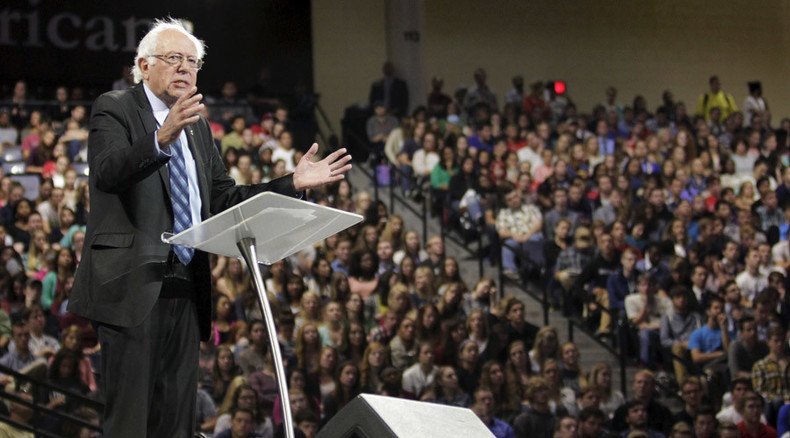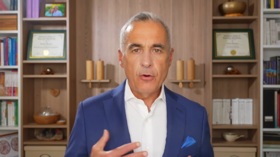Outsiders to contenders: Occupy Wall Street, Bernie Sanders & a new attack on inequality

When Occupy Wall Street took the US and world by storm, the group was seen as a band of outsiders. Now, its message of tackling the “1 percent” is experiencing a revival on the campaign trail with a leading presidential contender – Bernie Sanders.
In the months since launching his campaign, Sanders, an independent senator from Vermont, has proven to be an outspoken and unapologetic voice against economic inequality. He has repeatedly criticized the concentration of wealth at the top 1 percent, the fact that millions of Americans toil away for only minimum wage, and the growing financial burden of education.
“People do not understand why the middle class of this country is collapsing at the same time as almost all the new income and wealth is going to the top 1 percent,” Sanders told CNN last month.
“People do not like the idea that as a result of Citizens United, our campaign finance system has become corrupt and politicians are dependent upon super PACs and billionaires for money. People want us to deal with climate change [and] make college affordable.”
If much of his platform sounds familiar, that’s because Occupy Wall Street protesters were airing many of the same arguments in New York’s Zuccotti Park and across the US four years ago.
Echoing complaints by Occupy that the US government has done little to rein in big banks and corporations in the wake of the 2008 financial crisis, Sanders has called the economy “rigged” in favor of the wealthy. He has called for the breaking up of big banks and reducing the amount of money corporations can plunge into the political process.
Nowadays, many of those Occupy protesters are even campaigning for Sanders, who has said he wants to start a “political revolution.”
#BernieSanders tells conservative Christians inequality is a moral crisis #bernieatliberty
http://t.co/bnA9Da9I7Rpic.twitter.com/ixU1Ym3AGU
— RT America (@RT_America) September 15, 2015According to the Guardian, the influence of Occupy activists isn’t limited to people who officially join Sanders’ campaign. Former Occupy protester Stan Williams, now helping to run African Americans for Bernie, said that the skills he learned during the original protest have helped him spread Sanders’ message to minority groups.
Another Occupier, Charles Lenchner, has now co-founded the group People for Bernie Sanders. The organization is not affiliated with the campaign, but its creation marks another instance in which Occupiers have found themselves drawn to the Vermont lawmaker.
“Sanders’ rise in this election season is inconceivable without Occupy Wall Street having elevated the conversation around inequality and the way that the 1 percent are ravaging this country. You just can’t imagine one without the other,” he told the Guardian.
Medicare for all: #BernieSanders calls for single-payer health system http://t.co/6Ep1iLZbQ0pic.twitter.com/YgYOpAu1bM
— RT America (@RT_America) July 31, 2015On the People for Bernie website, more than two-dozen Occupiers signed onto a letter supporting Sanders.
“In September 2011, our efforts changed the narrative of American politics, helping to focus it on the issues of our time: Inequality, surrender to the power of concentrated wealth, the corruption of our democracy by moneyed interests, and the need for solutions as radical as our problems,” the letter reads, referencing the original movement.
When Sanders initially launched his campaign in May, not many people in the media or the political sphere took his bid for the presidency seriously, especially in the face of the nation-spanning organization being built by former Secretary of State Hillary Clinton, who is competing with Sanders for the Democratic nomination.
Protesters gather in Downtown Manhattan for Occupy Wall Street anniversary http://t.co/7dsaDJaI7ppic.twitter.com/fIgOsgJszi
— RT America (@RT_America) September 17, 2015However, Sanders has surprised many with a populist agenda focusing heavily on income inequality, the difficulties of earning quality healthcare and climate change. Now, polls show Sanders leading Clinton in Iowa and New Hampshire.
In Iowa, where the first primary will be held, the similarities between Sanders’ platform and Occupy have continued to draw crowds primarily of young people – students and those in their 30s and 40s.
“These are the type of people who were enthused with the Occupy Wall Street movement when that occurred,” John Colombo, Democratic Party chairman for Franklin County, Iowa, said to the Washington Times last month. “They are sick of business as usual and see Bernie Sanders as an alternative to what they’ve seen in the past.”
LISTEN MORE:












